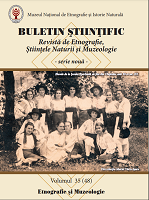Concepții ale muncii la mijlocul secolului XX: între gândire populară și programe politice
Conceptions of Labour in the mid-twentieth century: between Popular Thought and Political Programs
Author(s): Elena ReșetnicSubject(s): Cultural history, Political history, Social history, History of Communism
Published by: Muzeul Național de Etnografie și Istorie Naturală
Keywords: labour; Soviet period; socialist competition; traditional calendar; homo sovieticus;
Summary/Abstract: Labour represents an important part of human existence. A different method of work organization is typical for every evolutive phase, also a different attitude towards labour. In the traditional Romanian society, work is sacred, given by God, hence the extremely respectful and responsible attitude towards it. Faced with the implementation of processes such as collectivization, nationalization, mechanization, industrialization, etc., people come to perceive labour and its necessity, in a totally different way, because with the disappearance of private property, the interest of individual towards the result of his work disappears. Instead, the phrase “to work as in the kolkhoz” appears, signifying a work done with indifference and carelessness. Therefore, in the second half of the twentieth century, we have not only an intensification of the process of society’s modernization, which began in the interwar period, but also another social concept about work, which led to a change in the attitude of the individual towards it.
Journal: Buletin Științific. Revistă de Etnografie, Științele Naturii și Muzeologie
- Issue Year: 35/2021
- Issue No: 35
- Page Range: 159-167
- Page Count: 9
- Language: Romanian

